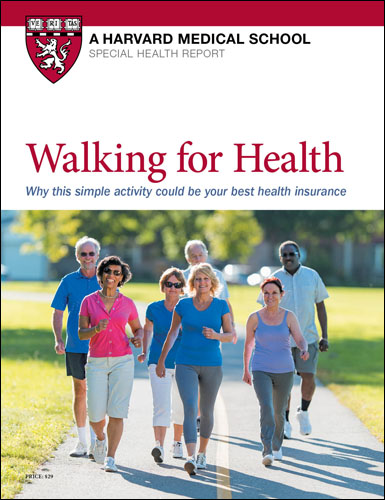Walking pace linked to reduced risks for an irregular heartbeat
News briefs
- Reviewed by Anthony L. Komaroff, MD, Editor in Chief, Harvard Health Letter; Editorial Advisory Board Member, Harvard Health Publishing
 Brisk walking is a great form of aerobic exercise that works your heart and lungs. Now the exercise is tied to lower risks for an irregular heartbeat (arrhythmia), according to evidence published online April 15, 2025, by the journal Heart. Scientists evaluated the self-reported health, exercise, and walking speed data of more than 420,000 men and women (average age 55) who were followed for about 13 years. Compared with people who said they walked at a slow pace (less than 3 mph), those who walked at an average pace (3 or 4 mph) or brisk pace (more than 4 mph) had up to a 43% lower risk for developing arrhythmias. The study was observational and doesn’t prove conclusively that faster walking speed will protect you against heart arrythmias, but it’s plausible: walking reduces arrhythmia risk factors, such as high cholesterol, high blood sugar, and high blood pressure.
Brisk walking is a great form of aerobic exercise that works your heart and lungs. Now the exercise is tied to lower risks for an irregular heartbeat (arrhythmia), according to evidence published online April 15, 2025, by the journal Heart. Scientists evaluated the self-reported health, exercise, and walking speed data of more than 420,000 men and women (average age 55) who were followed for about 13 years. Compared with people who said they walked at a slow pace (less than 3 mph), those who walked at an average pace (3 or 4 mph) or brisk pace (more than 4 mph) had up to a 43% lower risk for developing arrhythmias. The study was observational and doesn’t prove conclusively that faster walking speed will protect you against heart arrythmias, but it’s plausible: walking reduces arrhythmia risk factors, such as high cholesterol, high blood sugar, and high blood pressure.
Image: © Jose Luis Pelaez Inc/Getty Images
About the Author

Heidi Godman, Managing Director
About the Reviewer

Anthony L. Komaroff, MD, Editor in Chief, Harvard Health Letter; Editorial Advisory Board Member, Harvard Health Publishing
Disclaimer:
As a service to our readers, Harvard Health Publishing provides access to our library of archived content. Please note the date of last review or update on all articles.
No content on this site, regardless of date, should ever be used as a substitute for direct medical advice from your doctor or other qualified clinician.
















